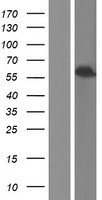order histories, retained contact details for faster checkout, review submissions, and special promotions.
Forgot password?
order histories, retained contact details for faster checkout, review submissions, and special promotions.
Location
Corporate Headquarters
Vector Laboratories, Inc.
6737 Mowry Ave
Newark, CA 94560
United States
Telephone Numbers
Customer Service: (800) 227-6666 / (650) 697-3600
Contact Us
Additional Contact Details
order histories, retained contact details for faster checkout, review submissions, and special promotions.
Forgot password?
order histories, retained contact details for faster checkout, review submissions, and special promotions.
ALDH1A3
aldehyde dehydrogenase 1 family, member A3
Aldehyde dehydrogenase (ALDH) isozymes are thought to play a major role in the detoxification of aldehydes generated by alcohol metabolism and lipid peroxidation. The gene for the human isozyme ALDH6 spans about 37 kb and consists of 13 exons. It is expressed at low levels in many tissues and at higher levels in salivary gland, stomach and kidney. The major transcript is approximately 3.5 kb however there is a less abundant transcript that is smaller by 111 bp in the 3' non-coding region and uses an alternative polyadenylation signal. The significance of alternative splicing of ALDH6 gene is currently unclear.
| Gene Name: | aldehyde dehydrogenase 1 family, member A3 |
| Synonyms: | ALDH1A3, Acetaldehyde dehydrogenase 6, ALDH6, Aldehyde dehydrogenase 6, ALDH1A6, RALDH3, Retinaldehyde dehydrogenase 3, RALDH-3 |
| Target Sequences: | NM_000693 NP_000684.2 P47895 |
Publications (1)






If you do not find the reagent or information you require, please contact Customer.Support@LSBio.com to inquire about additional products in development.










